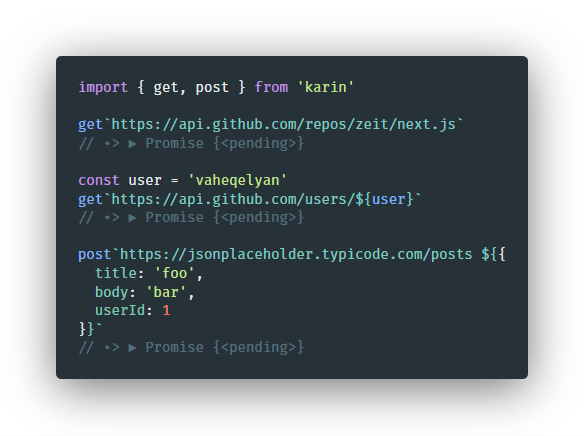Template literals are very useful. A more advanced form of template literals are tagged templates. Karin works in all major browsers (Chrome, Firefox, IE, Edge, Safari, and Opera). Modern browsers and JavaScript engines support tag templates. It is also compatible with Node.js. The package uses the Fetch API, make sure you have a polyfill to support older browsers. Recommend to use github/fetch
e.g.
import React from "react";
import { get } from "karin";
export default class Index extends React.Component {
static async getInitialProps() {
const { data, response } = await get`https://api.github.com/repos/zeit/next.js`;
return { stars: data.stargazers_count };
}
render() {
return (
<div>
<p> {this.props.stars} ⭐️</p>
</div>
);
}
}via NPM
npm i karin
via CDN (unpkg)
https://unpkg.com/karin@latest/build/browser/index.umd.js
UMD library exposed as Karin
const { get, post } = Karin;Import paths
import { get, post } from "karin/build/node";
import { get, post } from "karin/build/browser/index.umd.js";The response data - By default, if the response data type is Application/JSON, the response will be parsed into JSON
import { get } from "karin";
get`https://api.github.com/repos/vaheqelyan/karin`
.then(result => console.log(result))
.catch(err => console.error(err));The post data - If the data is an object, it will be stringified
The response data - By default, if the response data type is application/json, the response will be parsed into JSON
Note that the data to be sent is the last item.
import { post } from "karin";
const user = {
username: "vaheqelyan",
password: "XXXX"
};
post`http://localhost:3000/register ${user}`
.then(result => console.log(result))
.catch(err => console.log(err));post`https://example.com/api.createMsg?${{apiKey: config.apiKey}}
Content-Type: application/json
Accept: application/json
XXX: xxx
${{
title: 'Test Message',
body: 'This is a test of the messaging system.'
}}`Thanks to Ken Bellows for the idea.
See Version 0.11.1 for old syntax



